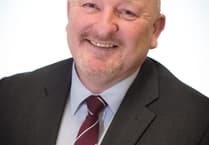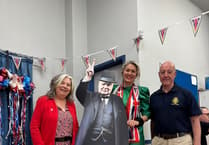HEALTH visitors in Gwent are likely to still have to use paper records until next year at least.
However councillors who raised concerns that paper notes could lead to delays in reporting child protection concerns, or staff missing vital information if they are unfamiliar with a family’s history, have been told nurses are aware they must raise any fears as a matter of urgency.
Councillors in Monmouthshire voiced their fears at the continued use of paper records in June when they were briefed about a pilot programme running across Gwent to support families with children up to the age of seven.
As well as highlighting the risks of recording notes on paper, rather than digitally, Beth Watkins, the manager of Monmouthshire County Council’s Flying Start programme that supports families with children under four in the most deprived areas of the county, outlined issues caused by changes to how midwives and health visitors employed by the Aneurin Bevan University Health Board work that had impacted the enhanced scheme.
As a result Nicola Prygodzicz, the chief executive of the board that runs NHS services in Gwent, was asked to appear before the council’s public services scrutiny committee.
When Ms Prygodzicz, and four other senior managers met with councillors on Tuesday, October 3, they said a number of issues have since been addressed.
Chris Overs, the board’s divisional nurse for children’s services, said health visitors all over Wales use paper records, though a digital system is being developed.
Ms Prygodzicz confirmed, when a councillor asked, it would be “2024 at least” before a digital system could be in place. She said the health board has encountered “operational issues and referral” delays with a digital system used for its mental health teams but is looking to develop a system for health visitors as she had visited a team “crying out for this.”
But while paper records are still in use Ms Overs said: “It will not lead to any delay in sharing safeguarding concerns and if identified they are shared as a matter of urgency in line with guidance.”
However she said the board was unaware the concerns would be raised in the meeting and said: “There was an impact on staff. The first thing they heard of any concerns raised was when there was an article in the Abergavenny Chronicle regarding safeguarding and record keeping. It really had an impact on staff who felt let down and undermined all the hard work they do to support families in the Monmouthshire area.”
At that point Ms Watkins said the issues had already been raised with the Welsh Government before the June meeting and said: “These issues were well known.”
But she told the committee since the meeting recording of data had improved, with the council concerned the health board’s decision to merge its specialist Flying Start health visitors with those who work with the families of all newborns, meant information wasn’t being accurately recorded and that could led to the local authority missing out on Welsh Government grants.
Ms Watkins also new “digital birth books” for all babies were helping health visitors identify which babies are from Flying Start areas.
Ms Overs acknowledged there had been a lack of awareness of the Flying Start requirements among health visitors and it had conducted further training. She said: “There was a misunderstanding and some staff believed Flying Start had ended. We had to do a bit of work to make sure all staff were aware it had not ended, and we apologise for any confusion around that.”
She said the board had taken the decision to move staff from the Acorn family support centre in Abergavenny to the Maindiff Court Hospital as a result of staff pressures. It also merged the caseloads of health visitors, rather than maintaining dedicated Flying Start teams, to ease pressures on those supporting families most in need.
As Flying Start is postcode based there are also families from those areas who require less support while families from other areas, with higher needs, also have to be supported.
Ms Overs said staff working with Flying Start families wanted the support of their colleagues and the board has to address a national shortage of health visitors which she said was compounded by the age profile of staff and “the increasing complexity” of the workload
Health visitors working with Flying Start families will have a caseload of 110 families while those supporting all newborns will have a caseload of between 250 to 300 with varying levels of support required. The Flying Start caseloads are now distributed across the health board’s health visitors.





Comments
This article has no comments yet. Be the first to leave a comment.